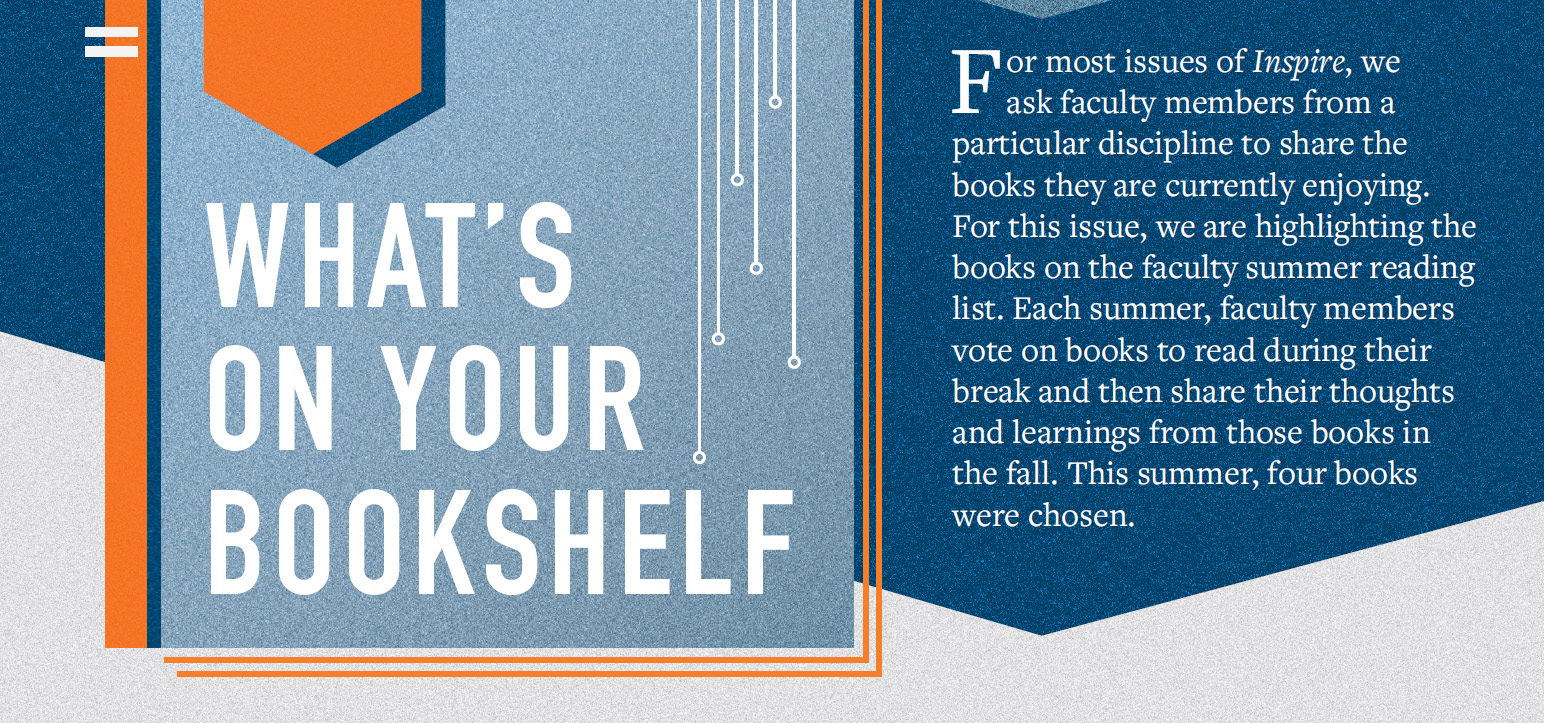
WHAT’S ON YOUR BOOKSHELF
For most issues of Inspire, we ask faculty members from a particular discipline to share the books they are currently enjoying. For this issue, we are highlighting the books on the faculty summer reading list. Each summer, faculty members vote on books to read during their break and then share their thoughts and learnings from those books in the fall. This summer, four books were chosen.
Dare to Lead: Brave Work, Tough Conversations, Whole Hearts
by Brene Brown
Leadership is not about titles, status, and wielding power. A leader is anyone who takes responsibility for recognizing the potential in people and ideas, and has the courage to develop that potential.
Four-time #1 New York Times bestselling author Brené Brown has spent the past two decades studying the emotions and experiences that give meaning to our lives, and the past seven years working with transformative leaders and teams spanning the globe. She found that leaders in organizations ranging from small entrepreneurial startups and family-owned businesses to nonprofits, civic organizations, and Fortune 50 companies all ask the same question: How do you cultivate braver, more daring leaders, and how do you embed the value of courage in your culture? In this new book, Brown uses research, stories, and examples to answer these questions.
Blindspot: Hidden Biases of Good People
by Mahzarin R. Banaji and Anthony G. Greenwald
“Accessible and authoritative…While we may not have much power to eradicate our own prejudices, we can counteract them. The first step is to turn a hidden bias into a visible one….What if we’re not the magnanimous people we think we are?”—The Washington Post
“Blindspot” is the authors’ metaphor for the portion of the mind that houses hidden biases. Banaji and Greenwald question the extent to which our perceptions of social groups—without our awareness or conscious control—shape our likes and dislikes and our judgments about people’s character, abilities, and potential.
The title’s “good people” are those of us who strive to align our behavior with our intentions. The aim of Blindspot is to explain the science in plain enough language to help well-intentioned people achieve that alignment.
White Kids: Growing Up with Privilege in a Racially Divided America
by Margaret A. Hagerman
American kids are living in a world of ongoing public debates about race, daily displays of racial injustice, and for some, an increased awareness surrounding diversity and inclusion. In this heated context, sociologist Margaret A. Hagerman zeroes in on affluent, white kids to observe how they make sense of privilege, unequal educational opportunities, and police violence.
Featuring the actual voices of young, affluent white kids and what they think about race, racism, inequality, and privilege, White Kids illuminates how white racial socialization is much more dynamic, complex, and varied than previously recognized. This book explores the extent to which white families, even those with anti-racist intentions, reproduce and reinforce the forms of inequality they say they reject.
The Coddling of the American Mind
by Greg Lukianoff and Jonathan Haidt
Something has been going wrong on many college campuses in the last few years. Speakers are shouted down. Students and professors say they are walking on eggshells and are afraid to speak honestly. Rates of anxiety, depression, and suicide are rising—on campus as well as nationally. How did this happen? First Amendment expert Greg Lukianoff and social psychologist Jonathan Haidt show how the new problems on campus have their origins in three ‘great untruths’ that have become increasingly woven into American childhood and education: What doesn’t kill you makes you weaker; always trust your feelings; and life is a battle between good people and evil people.
Lukianoff and Haidt explore changes in childhood such as the rise of fearful parenting, the decline of unsupervised, child-directed play, and the new world of social media that has engulfed teenagers in the last decade. They situate the conflicts on campus within the context of America’s rapidly rising political polarization and dysfunction.


